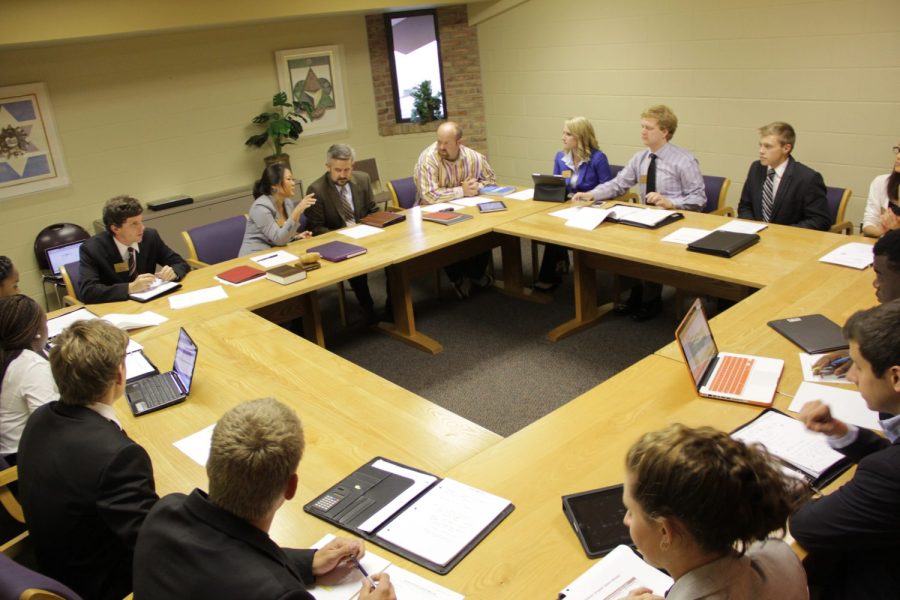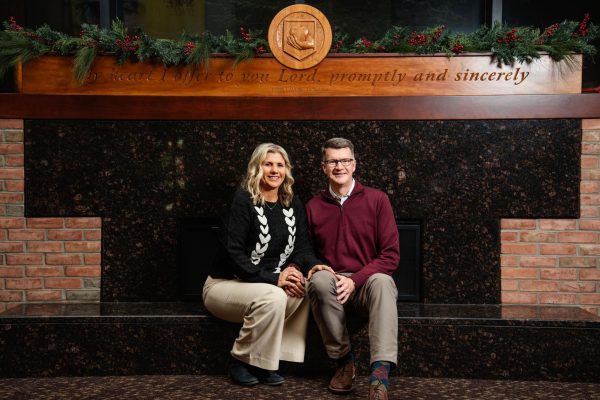Communication issues and lack of clarity have faculty questioning leadership team’s role
SALT is one of many leadership teams and committees that play a role in Calvin’s governance structure.
Calvin’s Senior Academic Leadership Team oversees strategy related to the academic division. It replaced a similar group called the Provost’s Council in summer 2021 and consists of Provost Noah Toly, Associate Provost Kevin den Dulk, the academic deans and the operational deans.
Lack of clarity around SALT’s role in Calvin’s governance structure and a perceived lack of communication have left some faculty feeling anxious about the group and overlooked in its decision-making. However, SALT members feel that many of the tensions with faculty are due to misunderstandings and factors beyond their control, such as many years of tough financial decisions and low trust in administration.
What is SALT?
Before and after the Provost’s Council name change, there has also been an operations team dedicated to managing what den Dulk calls the “nitty gritty” of supporting academic work on campus.
The Provost’s Council, according to den Dulk, functions more like the operations team does now than like SALT does now. However, den Dulk served on the Provost’s Council primarily during the COVID-19 pandemic, when the Provost’s Council was in a more responsive role than may have been typical in the past.
According to Toly, an advisory group consisting of provosts and deans had been recommended in the University Structure Master Plan. Some changes in membership were made as the Provost’s Council became SALT in order to address the shift to academic schools. These changes were announced at the Faculty Senate in Sept. 2021.
“Since then, we have communicated what SALT is, what SALT does and who is on SALT a number of times,” Toly told Chimes. “We look forward to continuing to update and share that important information with faculty.”
Each of Calvin’s five schools has a dean representing them on SALT. Additionally, at least one representative from SALT is on each of Calvin’s governance committees, according to Laura DeHaan, dean for academic administration, who started in her role as dean in 2017.
“What makes SALT an effective sounding board is you have a dean in each school so you have that closeness, and then you have three of us that work across disciplines, and you just hear a lot of faculty and student feedback, so it helps the provost, who can’t be involved in all discussions, hear some of these things,” said DeHaan.
DeHaan said that SALT, like the Provost’s Council, does not make policy related to educational goals. Instead, it discusses educational policies and decides “who is best to decide this policy in faculty governance.”
However, SALT does make some decisions.
“Sometimes there are decisions that we make internally, where we’re saying ‘We really need to address certain kinds of problems or needs on the campus,’” said den Dulk. Some budget and facilities issues could be examples of these problems and needs, den Dulk told Chimes.
As the Provost’s Council became SALT, the focus of the group shifted from “operations and support” to “big strategies,” according to den Dulk, who has been associate provost since Jan. 2020.
DeHaan, who was on the Provost’s Council prior to COVID-19, said that “the kinds of issues that we talk about have remained pretty similar.”
Faculty concerns
Some faculty members feel that it has been unclear how much influence SALT has on major university decisions.
“I think a lot of faculty are anxious to see a bit more clarity about exactly what the purview of SALT is, especially in terms of its decision-making power,” said Ryan Bebej, a professor of biology and member of Faculty Senate.
Some of this concern relates to a lack of clarity on how SALT, with its new focus on strategy and strategic planning, fits into existing governance structures.
“I think some faculty have reservations related to governance more generally,” said Craig Hanson, professor of art history and member of Faculty Senate. “What is SALT’s role relative to Calvin’s larger system of faculty governance?”
This lack of clarity has contributed to confusion over which groups make specific decisions.
“There’s a gap between where our hierarchical structure says decisions are being made, and where they’re being made,” said James Skillen, professor of environmental science and member of Faculty Senate. “We need greater clarity and transparency about who makes decisions.”
Jolene Vos-Camy, professor of French and chair of the Committee on Governance, confirmed that the shared governance review is considering interactions between SALT and other aspects of governance but told Chimes that SALT does not fall directly under the review’s mandate.
Faculty point to decisions like calendar changes and the four-two credit transition as examples of possible oversteps by SALT. However, SALT members maintain that the group was not primarily responsible for those decisions.
Tensions
From Toly’s point of view, natural communication channels exist between SALT and faculty in the form of department chairs – who are “regularly informed” of SALT’s work — and deans. Additionally, SALT has often held town halls and “regularly seeks and considers faculty input and feedback in various forms,” Toly said.
From a faculty point of view, however, communication issues have contributed to tensions between SALT and faculty.
“Calvin has very weak internal communications … and we have a poor record of engaging [employees] in decisions that will impact them,” said Skillen.
This lack of communication has contributed to misunderstandings, including the perception that SALT proposed the four-two credit transition.
“That perception is partly because many of the same people who were involved in advocating openly for this transition to a four-[two] credit model are also the folks who are on SALT right now,” said den Dulk.
Den Dulk said he understands where faculty are coming from when they say they feel the transition was forced on them, but that it mainly has to do with differing interpretations of the motivation for the transition.
“There may have been a perception around that transition that even though it was a choice in a formal sense, it felt like maybe there wasn’t a choice around it because part of its framing … was around financial needs of the university,” den Dulk said. “If you perceive it as largely about finances, and if the university would have been in a more difficult spot, without saying ‘yes’ then you might wonder, ‘Is this a real choice?’”
Den Dulk told Chimes this feeling was likely amplified by its coming on the heels of many years of tough financial choices at Calvin.
Communication issues between SALT and faculty committees played a role in the controversy over eliminating advising days, according to DeHaan.
“Even though it went to a [governance] committee, which is our standard practice, it just happened a little bit too fast for them to understand the full ramifications of what they were voting on,” said DeHaan.
SALT is “currently working on a number of ways to strengthen communication with faculty, including ways that faculty can speak into our work,” according to Toly, including sharing a “preliminary overview of that work with department chairs and senate.” Toly also said SALT plans to share additional details and request further faculty feedback in the future.
Skillen said he thinks “we have seen increased communication from both the provost and the president in this past year.”
Preexisting tensions between administration and faculty may also contribute to reservations about SALT. A survey assessment administered by Calvin’s Workplace Quality Task Force in partnership with Best Christian Workplaces Institute in spring 2022 found that faculty morale and confidence in leadership were low.
Skillen pointed to decisions made prior to Toly’s arrival — such as budget cuts — as the cause of the “low trust environment.” He said that overall trust in administration, not structure, is the cause of faculty reservations about SALT and its decisions.
“If those numbers stay where they are, no structure is going to be adequate to address our communication problems,” said Skillen.









